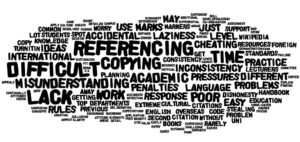Chapter 1: Plagiarism and Academic Integrity
By the end of this chapter, you should be able to:
- Examine strategies for maintaining academic integrity. (LO5)

What is Plagiarism?
Review the following slides to learn more about plagiarism and how to prevent it, this will help you maintain academic integrity. You can expand the slides to full screen by selecting the double-pointed arrow in the lower right corner of the slides.
Academic Integrity
The work you do as a student or faculty member represents you as a person and reflects your academic integrity. It is solely your responsibility to be honest and forthright when conducting research. If you are not sure on how to do that, contact your library or relevant instructor for more help and guidance. Select each of the hot spots on the graphic below to learn about the different components of academic integrity.
If you still are not sure how to maintain academic integrity, here are some strategies that could help you:
- Class Participation: Attend class regularly and arrive on time; complete assigned work on time; listen respectfully to the ideas of others; advance the conversation with your own questions/answers.
- Course Readings: Read assignment materials. Read in chunks by previewing section headings first; distribute your reading through the week.
- Exams, Tests, and Quizzes: Use only the allowed resources, whether in-class or at-home when completing assessments. Study thorough ahead of time in a way that meets your learning needs.
- Papers, Projects, and Presentations: Write true, honest papers and cite the work of others where applicable; cite everything (images, videos, data, etc.). If you need help: ask!
- Research: Log notes and develop a system to distinguish your ideas from others; develop a working-references list to track the resources used.
- Group Assignments: Clarify instructor expectations, participate responsibly.
- Lab Work: Work together with your partner; keep your own notes, write your own results; record data as honestly as possible, do not rely on your memory.
References for Remixed Content:
PALNI (2022, June 3). Academic integrity. PALNI Information Literacy Modules. https://libguides.palni.edu/instruction_resources/ILModule10
PALNI (2022, June 3). Understanding plagiarism and citing sources. PALNI Information Literacy Modules. https://libguides.palni.edu/instruction_resources/ILModule11
Purdue Owl (2021). In-text citations: The basics. Purdue OWL. https://owl.purdue.edu/owl/research_and_citation/apa_style/apa_formatting_and_style_guide/in_text_citations_the_basics.html
University of Waterloo Library (n.d.). Principles of academic integrity. University of Waterloo. https://uwaterloo.ca/library/research-supports/academic-integrity/academic-integrity-tutorial/fundamental-values-academic-integrity/academic-misconduct/principles-academic-integrity

